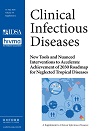Latest Publications
Accelerating Progress Towards the 2030 Neglected Tropical Diseases Targets: How Can Quantitative Modeling Support Programmatic Decisions?
 Vasconcelos, Andreia, King, Jonathan D., Nunes-Alves, Cláudio, Anderson, Roy, Argaw, Daniel, Basáñez, Maria-Gloria, Bilal, Shakir, Blok, David J., Blumberg, Seth, Borlase, Anna, Brady, Oliver J., Browning, Raiha, Chitnis, Nakul, Coffeng, Luc E., Crowley, Emily H, Cucunubá, Zulma M., Cummings, Derek A. T., Davis, Christopher N., Davis, Emma L., Dixon, Matthew, Dobson, Andrew, Dyson, Louise et al
Vasconcelos, Andreia, King, Jonathan D., Nunes-Alves, Cláudio, Anderson, Roy, Argaw, Daniel, Basáñez, Maria-Gloria, Bilal, Shakir, Blok, David J., Blumberg, Seth, Borlase, Anna, Brady, Oliver J., Browning, Raiha, Chitnis, Nakul, Coffeng, Luc E., Crowley, Emily H, Cucunubá, Zulma M., Cummings, Derek A. T., Davis, Christopher N., Davis, Emma L., Dixon, Matthew, Dobson, Andrew, Dyson, Louise et al
Over the past decade, considerable progress has been made in the control, elimination, and eradication of neglected tropical diseases (NTDs). Mathematical modeling can help inform selection of interventions to meet the targets set out in the NTD road map 2021–2030, and such studies should prioritize questions that are relevant for decision-makers, especially those designing, implementing, and evaluating national and subnational programs. In September 2022, the World Health Organization hosted a stakeholder meeting to identify such priority modeling questions across a range of NTDs and to consider how modeling could inform local decision making. Here, we summarize the outputs of the meeting, highlight common themes in the questions being asked, and discuss how quantitative modeling can support programmatic decisions that may accelerate progress towards the 2030 targets.
